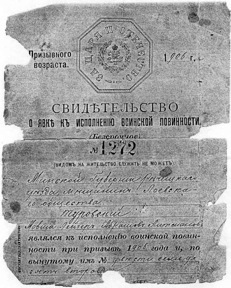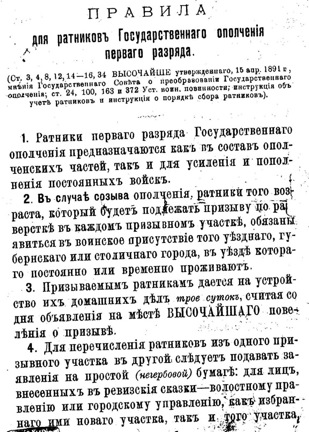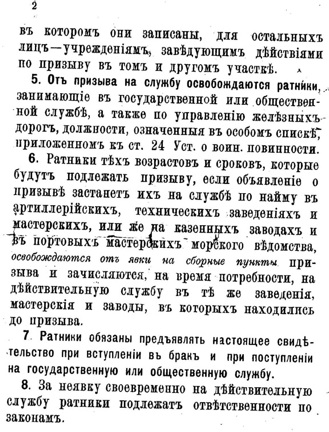Family Louis TUROW
Clara "Chaje Feiga" MELAMED, daughter of Abraham MILLER (MELAMED) was born in Mayzr (Mozyr), Minsk, in Ukraine, Russia. Clara arrived in America in 1916, age 26 per the 1930 census. She married Louis TUROW in Russia. Louis arrived in America in 1913, age 26, with his occupation lock smith.
The 1920 census shows he arrived 1915 age 26 shows his occupation as candy maker. The 1930 census listed his occupation as soda fountain maker. Louis' manifest shows he arrived actually arrived in 1913 and the 1920 and 1930 census forms had the incorrect year indicating how often census data was not always accurate.
Louis was issued a Russian internal passport in 1913 allowing him leave his town of Minsk, Russia (now the Ukraine) and move within the country - but not leave it - but he used it to escape to America. Louis served in the Russian military (draft). Louis and his brother, Jake, arrived in America via Canada on August 18, 1913 on the ship Montezuma which left from the port of Antwerp, Belgium. Their manifest names were Moische L. and Jankel TUROWSKY. Louis' occupation on the manifest was locksmith. Note that on Louis' passport is the name 'Movsha' which would be Americanized to Moische. Their destination was Chicago, and Louis indicated his nearest relative in Europe was his wife, Chaje. Louis worked with Max MILLARD at the Alt-Silver Plate Mft, 417 State St, Chicago during WWII era.
Louis TUROW's name in Russia on his passport was Movsha Leyzer Abram Litmanovich Turovsky and on his military draft paperwork was Toviya-Leyzer Abramovich Aitmanov Turovsky. He reported for the 1906 Russian draft call. He was subject to duty in the people's militia until age 43, or 1 January 1929. He showed up for military service on March 15th, 1907; under "Rank or Status and Society" he was designated a "Petty bourgeois." Nothing more is know about his Russian military service.
Russian Passport, with translation, for Louis Turow
Movsha Leyzer Abram Litmanovich Turovsky.
In Yiddish he was probably called Moishe, Litman's zin (son).
The Imperial and Soviet governments, both, required residents to carry internal passports. The documents in question are not for foreign travel, nor for travel in general. They give the bearer permission, for a length of time, to reside somewhere other than the place of issuance. He was permitted to live elsewhere from mid 1913 though mid 1914.

Document is titled in Cyrillic: PASPORT" with questions down the left-hand
side covering the same matters, namely residence permits.
Cursive handwriting is difficult to read, particularly in the Old Orthography - the Russian alphabet that was shortened in about 1923.
This passport was issued by the Council of Townspeople.
The word meshchansogo refers to a social class rather than a place.
Persons in the Russian Empire were categorized by social class: peasant, military,
nobility, clergy, town dweller, and so forth. Jews could not be land owners,
nor noblemen, nor practice trades or professions, nor live in large cities -
Odessa was a major exception - or in Great Russia proper. They were classed
as bourgeoisie, which was really a misnomer since most scrambled around living
by their wits.
Their classification under the term meshchanin for males, meshchanka for women
took on the denotation of petty bourgeoisie after WWII in the USSR. Some genealogists
erroneously twist the term to mean small business person, or, more plainly,
business person.
Of a place called, the best that can be made out, Loevsky or Loivsky, in the Rechitsa district of the province of Minsk. The bearer is given permission to leave the place and to reside elsewhere in the Russian Empire. For how long; starting when? I can't say because I cannot read the 4th through 6th lines under the great big lettering - which says Minsk. So a council of townsmen had control over the non-religious status of all Jews, is the way it boils down. Thus our Moishe, Litman's zin (son), had to get permission from them to leave town.
The bearer is Movsha Leyzer Abram Litmanovich Turovsky.
In Yiddish he was probably called Moishe, Litman's zin (son).
The document is signed by the Chairman of the Village Elders in addition to a member of the Council. I can not read their signatures.
Next to item 7, on the left side is Moishe's own signature. He signed Movsha Leyzer Turovsky in a shaky but passable Russian script, as though he had learned to write Russian pretty late in life on his own.
The biggest seal, on top, tells us that there was no payment needed for this document. (International passports from the 19teens cost 50 rubles, if I remember correctly.) It also says that it is good for no more than 1 year. Next to the seal is what appears to be a post-printing stamp that talks about specific conditions for Jews as well as about permanent residency. That's as far as I can go because the stamp is either indistinct on the original, or the scan dropped out a lot of information.
On the left:
1. Asks for religion. Written in is Judaism.
2. Asks for DOB or age. 29 is written.
3. Wants to know how his family earns their bread. Left blank.
4. Asks if he is currently married or was married. Currently.
5. I'm not sure. It wants to state the proximity to something. Left blank.
6. Asks about his relationship to military conscription. Of the 5 words I can
make out nos 2, 4, and 5. This indicates to me that he will be, or was, called
up with some sort of militia unit and has to do with 1906. Thus, the 1906 in
the area devoted to his military obligation apparently refers to active service.
There are a number of words that seem to be place names connected with his unit
and the purpose for the call up.
Down near the bottom there are two dotted lines to permit an extension of the permit.
At the right is place for another fee-free seal.
In the center is the document number: 422.
In the upper left is another number which I will bet is the identification of the clerk who made out the passport. No 328.
Now, when you see noir movies that have sinister-looking officials demanding from frightened travelers, "Your papers", you have an idea of what the oppressed fish out.
Translations from Russian: Draft related papers of Louis TUROW
Toviya-Leyzer Abramovich Aitmanov Turovsky
Draft paper #1272, page 1 of 3 Dated 1906.
The seal says "For the Tsar' and Fatherland"
At the upper left it says "of draft age" (perhaps a word missed)
EVIDENCE
of appearance to fulfill military obligation
(undated)
No 1272
(cannot serve as a residence permit)
[written]:
Minsk Guberniya
?Rechitsky? Uyezd [~County]
[a few words Los'sky] Society
Turovsky
Toviya-Leyzer Abramovich Aitmanov
appeared for the 1906 draft
[spells out his draft card number at the end]
Draft paper #1272, page 2of 3 Dated 1906.
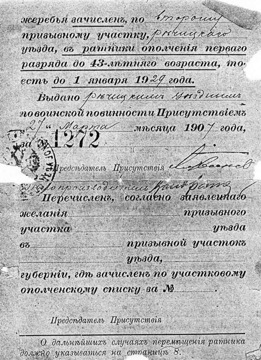
Says he was subject to duty
in the first category [[I think that means 1-A]]
in the people's militia until age 43, or 1 January 1929..
The 1907 date is 27 March.
Draft paper #1272, page 3 of 3 Dated 1906.
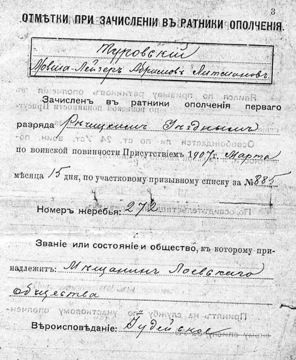
Service notations in militia service
Turovsky
Toviya-Leyzer Abramovich Aitmanov
[basically says he showed up on March 15th, 1907;
under "Rank or Status and Society" it has handwritten:
"Petty bourgeois"
This translation of the Russian Draft Rules, original Russian images below, are basically the regulations equivalent to our Selective Service regulations pertaining to those draft-eligible for the militia. Louis was given these when he was drafted. RULES 1. Soldiers of the First Category of the State militia are 2. In case of call up of the militia, the soldiers of that age [group] 3. Draftees are given THREE DAYS to take care of their household 4. To transfer a soldier from one draft sector to another a notice 5. Soldiers are freed from service who hold state or senior 6. Soldiers of those age [groups] and time periods who will be 7. Soldiers are obligated to present valid certificates when getting married and when entering State or public service. 8. For failure to appear on time for active duty, soldiers are subject to legal responsibility. |
Original Russian Document, 8 short paragraphs. page 1 of 2 |
Original Russian Document, 8 short paragraphs. page 2 of 2 |
